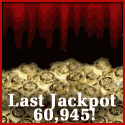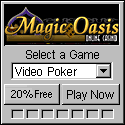Play
To Win
Tips and strategies to help make you a winning casino player Game
Rules
Learn: Blackjack, Baccarat, Craps, Roulette, Slots, Video Poker, Pai Gow Poker
Systems Gallery
Win more, more often with proven betting methods from the systems gallery
Order
Form
A secure on-line order form to purchase products advertised by Let's Talk
Winning.
Playing Online
All about gambling at online casinos. Find out where the best deals are
Links
and Things
Sign our guestbook, refer a friend, link to other gambling sites
Newsletter
Click above to read the current edition of our
weekly newsletter. Then get your own free subscription right here. Enter your e-mail
address for immediate delivery of an introductory issue, including a FREE ROULETTE SYSTEM:
Please tell all
your friends about it.
On-Line Forum
Post a gambling question or opinion - get an
answer . . .
 Wanna Win At Slots? Click
Here! Wanna Win At Slots? Click
Here!





VegasUSA promotion
ends June 30, 2001

It's now $50 bonus every month!





|
=========================================
Thursday, August 16, 2001
Bankroll
Requirements for each Game
Hello
everyone,
No
matter what game you play, you usually require a bankroll big enough to withstand any
system you may apply. Frank Scoblete gives us an indication of how big this bankroll
should be.
Albert Einstein liked to do "mind experiments." For example, he
once pictured
himself on a train traveling 30 miles per hour and thought, "If I shine a flashlight
to the end of the car, the light will be traveling at 186,000 miles per second in relation
to the interior of the train, but at what speed will it be traveling in relation to the
ground? Do you add the speed of the train to the speed of light and come up with light
traveling at an extra 30 miles per hour?"
Einstein realized that the speed of the train actually had no effect on the speed
of the light. Unlike a man walking at 5 miles per hour on a train going 30 miles
per hour, whose speed would be 35 miles per hour compared to the ground, light would
travel at a speed of 186,000 miles per second both in the train and compared to the
ground. Is this illogical? Yes. True? Yes. Weird? Absolutely.
So here's my mind experiment: You have a casino game that returns 300
percent of all the money wagered at it. In the long run, for every dollar played at that
game, the player can expect to win two dollars. However, the game is set up in such a way
that, on average, you win a jackpot of 1.5 billion dollars once in every 500 million
decisions - but all the other decisions are losers.
You then have a second game where the house pays back $99.50 for every $100 you bet (on
average), and you can expect to win about 44 percent of your decisions. (Astute
Let's Talk Winning customers will recognize this game as blackjack.)
Now, which game is almost guaranteed to break your bankroll (your bankroll, now, not Bill
Gates', Kerry Packer's or Sultan of Brunei's), and which game will give you a decent
chance of walking out of the casino a winner? Is it the game where the player faces a
house edge of one half of one percent? Or is it the game where the
player has a whopping edge of 300 percent over the house?
For the overwhelming majority of people, the game that returns two dollars for every one
dollar wagered (or $3 if you count the original bet) is a killer, and the game that takes
50 cents of every $100 we wager gives us a good run for our money: Why? Because the chance
of hitting that 1-in-500-million jackpot is remote, to say the least. The bankroll
required to have a decent shot at it without going broke would dwarf the gross national
product of a small nation. The bankroll needed to play the
other game with an almost positive assurance of not losing it all is minuscule in
comparison, and could easily be found in the bank accounts of kids under 12 in towns
allover the world.
What does this mind experiment prove? That the house edge, while important, is not the
be-all and end-all of gambling. The speed of the game, the hit frequency and the number of
winning decisions are equally important in answering the crucial question: "How big a
bankroll do I need to absolutely assure myself of not going broke?"
Now, why do I take it so far as to mention going broke? Because I've been there and it's
awful. I have the dubious distinction of being one of the few blackjack card counters to
actually hit what the mathematicians call "ruin." It happened more than 10 years
ago on my second extended trip to Atlantic City, during a 16-day stint playing the
Tropworld's four-deck game. My wife, the beautiful Ap, and I had hammered Tropworld for
two weeks a month earlier, and we had delusions that we
would become professional blackjack players and billionaires.
It wasn't to be. To make a long, agonizing story into a short, agonizing story: We lost
every penny we had won on the previous trip and (it hurts to even remember this) every
single stinking penny AP and I had saved for our gambling bankroll. Had AP not taken me
for a long walk on the Boardwalk on that 16th day and suggested we go to see the Captain,
my gambling mentor, I might have easily drained our bank accounts and continued playing.
I was on tilt. I was not thihking clearly. I had gone mad. Luckily, AP had kept her wits
about her. "I saw a couple living on the Boardwalk," she said.
"They had all their earthly possessions in two carts, and I thought, 'That could be
us if we continue to lose,"'
So we went to the Captain and the second he saw us he said: "There they are with
empty pockets." It was plastered across our faces in giant Day-Glo letters: LOSERS!
He explained to us what had gone wrong. Even with an edge, the game of blackjack is a
roller coaster, and you must have a big enough bankroll-to-bet ratio to endure the ups and
downs that inevitably occur when you play it. You have to have the money to know that no
matter how bad the session you're in is, you can't possibly lose everything. In fact, you
should have enough money to know that no matter how bad the next week, month or six months
are, you still can't get wiped out. That lets you play your game without pressing and
making mistakes.
When AP and I next ventured into the casinos, we had more money behind us, so we knew that
short of losing every decision for the next six months, we would be in the game. Of
course, not everyone in the casino plays with the advantage card counters have. Most
players are up against house edges of 1 to 6 percent or more. Still, the nature of
gambling is such that in the short run anything can - and does - happen.
The math of gambling can tell you quite clearly what your average expected loss (or win)
will be at any game. All you have to do is plug your betting levels into a very simple
mathematical formula: Average Bet x Number of Decisions Per Hour x Hours Played x House
Edge = Expected Win/Loss.
So if you wanted to play blackjack heads up for one hour at $10 a hand with perfect basic
strategy (putting you at a 0.5 percent disadvantage), you could expect to lose on average
four dollars ($10 average bet x 80 decisions per hour x I hour x 0.5% house edge = $4).
Unfortunately, owing to the streaky, freaky nature of chance, the above formula really
wouldn't tell you if you were going to lose all, most, some, or none of your money in that
hour or the next - or whether you would win a bundle or a single bet.
Because averages are, well, averages. The American family has on average 2.3 kids, but how
many married people do you know with that 0.3 kid? Families have kids in ones, twos,
threes and more. So, too, wins and losses at casino games rarely match the average
expectation on a given evening because wild, weird and
wonderful things can happen. The following real-life examples demonstrate:
1. In August 2000, casino veteran Joan Canwright played Let It Ride at Bally's in Atlantic
City and lost $300 at $10 per hand - without winning a single hand!
2. At Caesars Palace on july 14, 2000, gaming writer Barney Vinson witnessed the number 7
come up on one roulette wheel six times in a row - a billions-to-one shot!
3. At The Desen Inn in February 1998, slot expert John Robison went 93 spins on a slot
machine without one hit.
4. At the Maxim Casino in Las Vegas in July 1995, a $5 player won 23 straight blackjack
hands - some with doubles, splits, and splits with doubles - playing heads up against a
dealer in a six-deck game. On the fourth hand, he started to escalate his bets, and he
ended up winning several thousand dollars. I saw this.
5. At the Imperial Palace in Las Vegas in August I 994, long-time player Morris
Guttermainn lost at roulette 11 times in a row. He was betting on red. Black came up 12
successive times. Somewhere in that awful run, Morris deceded to start increasing his bet,
figuring that red had to come up sooner or later: as indeed it did after he had lost all
his money!
Outlandish wins or horrendous losses can send your bankroll skyrocketlng to the heavens or
skidding down the storm drain. To protect yourself against the latter, here's a simple
formula to help you determine what you need to bring to the casino for one hour of play at
your favorite game:
Ps = (q/p)a - (q/p)s / (q/p)a -1 x Pi x e=mc2..Just kidding :)
My advice is to bring enough to last one hour under the assumption that you're going to
lose every single bet. It doesn't get simpler than that.
All you have to do is ascertain how many decisions the game you're playing will require in
an hour, then multiply that by your betting unit ($5, $10, $15, $25 or more) and you'll
arrive at the amount of .money you should take to assure that you can last for one hour
during which the goddess of chance decides to treat you the way the pigeo treat the
statues in the park. (Bring half that much if you figure you can handle
losing it all, as even half of the suggested bankroll would be very difficult, though but
not impossible, to lose one hour's time.) With all this in mind, let's look at some
specific games.
Blackjack
A dealer at a crowded blackjack table can get through about 60 hands in an hour. So bring
70 units (70 times your average bet). Why 70? Because on some hands you'll have to split
and/or double down. A $5 player should have $350; a $25 player needs $1,750. Bring this
much and you'll probably be delighted to discover that as a basic strategy player, you'll
stand a good chance of playing two or three hours without a serious threat of going belly
up.
Craps
Determining the bankroll you need to guarantee that you won't get wiped out at craps is
tricky, since there are so many different bets. If you make the Crazy Crapper bets with
high house edges and low hit frequencies (the 12 for example), you'll need a LOT of money
to survive a craps table's120 or more rolls per hour. If you playa smart, conservative
game of Pass/Come with odds, and possibly place the 6 and/or 8, then you should bring 10
times the amount of your spread when you're up on the total number of numbers you want to
be up on. (That sentence was
almost as weird as Einstein's light experiment, but just as true.) Here's an example: If
you wanted to bet $5 on the Pass line and back it with $10 in odds, and then make two $5
Come bets with $10 in odds behind each, your spread would be $45, So you'd need a $450
bankroll. If you just wanted to go with one Pass or Come number, then your spread of $15
would require a total stake of $150. If you play the 5-Count system, you can give yourself
extra insurance against bankroll death.
Roulette
If you're making even-money bets (Red/Black, Odd/Even, 1 to 18, 19 to 36), you need 40
times your unit bet to assure that you won't go broke.
Roulette has approximately 40 decisions per hour, so it would seem that a $5 player would
need $200. A more realistic figure, however, would be 23 times your bet. Why 23? Because
that's the most times in a row I've ever heard of any outside bet coming up (if memory
serves, it was black), and I doubt that the next time you play roulette you'll see such a
record broken. So $5 bettors can be reasonably assured of lasting one hour with $115. The
inside bets are another thing entirely. There are 38 numbers, which makes it hard to
guarantee that you'll win even one bet in an hour of play. In fact, it's not unusual for
someone to lose 40 decisions in a row betting one inside number. So go in with 40 units
and pray that the dealer doesn't spin any more decisions than that in your first hour.
Let It Ride
Here's a game with a low house edge that can be awesome or awful, depending on how your
luck is running. The reason is that the win frequency is a mere 25 percent. That's right -
you win approximately one out of every four decisions, and you can gallop a long, long
time on the losing end of this pony. Recall Ms. Cartwright, who lost 30 straight
decisions, and you can see why you need some bucks behind you to guarantee you can't
possibly get wiped out. So how much is enough? About 60 times your minimum bet. Since Let
It Ride allows you to take down two of your three initial bets, when you lose you tend to
lose only on the third bet (the "$" bet). With some exceptions, you don't let
that first bet ("1") or the
second bet ("2") ride unless you are assured of a winner (holding a pair of 10's
or better). So if you play for $5, bring $300 with you and you shouldn't have any fear of
being stampeded.
Caribbean Stud
This game can be fast, slow or in-between, depending on how fast the dealer deals and how
quickly the players make their decisions. An average of 40 - 50 decisions an hour is
common, so bring 50 times your minimum bet and you should be able to last an hour if a
storm of bad fortune slams your way.
Baccarat and Mini-baccarat
Baccarat is a slow game and mini-baccarat is a fast game. The former will have 30 to 50
decisions an hour at a full table; the latter will have upwards of 150 decisions an hour.
If you can afford it, play baccarat, even if you have to play for slightly more mone. The
speed of mini-bac can rip through a bankroll.
Spanish 21
Use the same formula as regular blackjack, but don't use the same basic strategy. Use the
Armada Strategy; Spanish 21 is a different ship than its sister vessel.
Three Card Poker
This is a very fast game, so bring approximately 80 times your average bet and you should
have no fear of being wiped out.
Slot Machines
Most slot machines are programmed to hit about 15 percent of the time. That doesn't
necessarily mean that you'll win money 15 percent of the time; some hits simply return the
coins you've just played. One of the big differences between slot machines and table games
is that the player controls the pace of play. You could, if you wanted to (and were crazy)
play one coin every year, or you could, if you wanted to (and were even crazier) playas
fast as your finger could hit the PLAY MAX CREDITS button. So as far as a bankroll goes,
you be the judge. I'd say a nice pace that will give equal parts adrenaline rush and
level-headedness would
be about 240 spins an hour. Just multiply that number by whatever you intend to put into
the machine per decision, and you have how much you need in order to assure no possibility
of the one-armed bandit's holding you up for all of your cash. This advice holds true for
video poker as well, where you also determine the number of decisions per hour.
Now that you know how much money to bring to assure yourself of not getting wiped out,
should Lady Luck wipe her feet on you, remember that perfecting your strategy in these
games is a separate and equally important issue.
Check out the strategies in Systems Gallery and
learn them well before applying them for real.
Remember this too: Learn from my mistake. I know what it's like to come home with empty
pockets. It's one of the worst feelings in the world, so as always, bet smart, have fun
and play within your means.
Wishing you
all the best,
Until next week,
Izak
| WOULD YOU LIKE
TO SUBSCRIBE? |
 |
If you missed any
newsletter, click here for an archive.

|
 Let's Talk Winning
Let's Talk Winning